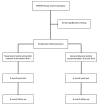A randomized controlled trial of an exercise intervention targeting cardiovascular and metabolic risk factors for prostate cancer patients from the RADAR trial
- PMID: 19951446
- PMCID: PMC2790468
- DOI: 10.1186/1471-2407-9-419
A randomized controlled trial of an exercise intervention targeting cardiovascular and metabolic risk factors for prostate cancer patients from the RADAR trial
Abstract
Background: Androgen deprivation therapy leads to a number of adverse effects including deterioration of the musculoskeletal system and increased risk factors for cardiovascular and metabolic complications. The purpose of this study is to determine the effects, efficacy, retention and compliance of a physical exercise intervention in a large established cohort of prostate cancer patients from the Randomised Androgen Deprivation and Radiotherapy (RADAR) study. Specifically, we aim to compare short- and long-term effects of a prostate cancer-specific supervised exercise program to a standard public health physical activity strategy utilizing printed resources on cardiovascular and metabolic risk factors. Our primary outcomes are cardiorespiratory capacity, abdominal obesity, and lipid and glycemic control, while secondary outcomes include self-reported physical activity, quality of life and psychological distress.
Methods/design: Multi-site randomized controlled trial of 370 men from the RADAR study cohort undergoing treatment or previously treated for prostate cancer involving androgen deprivation therapy in the cities of Perth and Newcastle (Australia), and Wellington (New Zealand). Participants will be randomized to (1) supervised resistance/aerobic exercise or (2) printed material comprising general physical activity recommendations. Participants will then undergo progressive training for 6 months. Measurements for primary and secondary endpoints will take place at baseline, 6 months (end of intervention), and at 6 months follow-up.
Discussion: This study uses a large existent cohort of patients and will generate valuable information as to the continuing effects of exercise specifically targeting cardiovascular function and disease risk, insulin metabolism, abdominal obesity, physical function, quality of life and psychological distress. We expect dissemination of the knowledge gained from this project to reduce risk factors for the development of co-morbid diseases commonly associated with androgen deprivation therapy such as cardiovascular disease, obesity, metabolic disease and diabetes, as well as improvements in physical and functional ability, and quality of life.
Trial registration: ACTRN12609000729224.
Figures
References
-
- Yancik R, Ganz PA, Varricchio CG, Conley B. Perspectives on comorbidity and cancer in older patients: approaches to expand the knowledge base. J Clin Oncol. 2001;19(4):1147–1151. - PubMed
Publication types
MeSH terms
Substances
LinkOut - more resources
Full Text Sources
Medical



